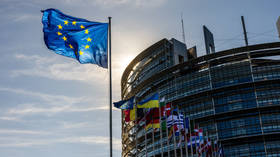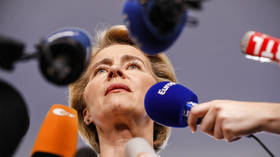EU MPs label Soviet famine as 'genocide'

The European Parliament on Thursday adopted a resolution declaring the 1930s famine in the Soviet Union to be a deliberate genocide of Ukrainians, urging “all countries” to do the same and demanding an apology from Russia.
The move comes two weeks after the German Bundestag agreed wholesale with the official Kiev narrative about the events, which Moscow condemned as shameful historical revisionism.
The resolution “recognises the famine inflicted by the Soviet regime on Ukraine in 1932-1933 – known as the Holodomor – as genocide,” accusing Russia of “whitewashing and glorification of the totalitarian Soviet regime and the revival of Soviet dictator Joseph Stalin’s cult” and of being a “state sponsor of terrorism,” according to a press release signed by spokesman Viktor Almqvist.
The statement also accused Moscow of seeking to “liquidate Ukraine as a nation state and destroying the identity and culture of its people,” and of creating a global famine by “destroying and looting” Ukraine’s grain and preventing its export to those in need.
There were 507 votes in favor of the resolution, with 12 MEPs against and 17 abstaining.
Between eight and nine million people, according to various estimates, perished in the Soviet Union during the 1930-33 famine, during severe drought and the forced collectivization of agriculture. Modern Kiev has branded the event as “Holodomor” and conducted a long-running propaganda campaign which falsely presents the famine as exclusive to Ukraine, ignoring millions more deaths in present-day Russia and Kazakhstan.
On November 30, the German parliament adopted a similar resolution, fully endorsing Ukraine’s narrative and openly tying it to the current conflict, arguing it was the reason Berlin must continue to support Kiev. The Russian Foreign Ministry responded by saying Germany was “trying to rewrite their history and forget the repentance for the horrors they committed during World War II.”
The “Holodomor” rhetoric is an attempt to relativize both the Holocaust and the Nazi atrocities in the Soviet Union, while promoting the “Western-sponsored and implanted campaign to demonize Russia, to pit ethnic Ukrainians against Russians and other peoples of Russia and the former USSR,” Moscow said.
Russia has also rejected EU accusations about present-day food troubles, pointing out that the lion’s share of Ukrainian grain has gone to the EU and other wealthy countries, while Western sanctions on Russian shipping continue to hinder Moscow’s aid to Africa.













